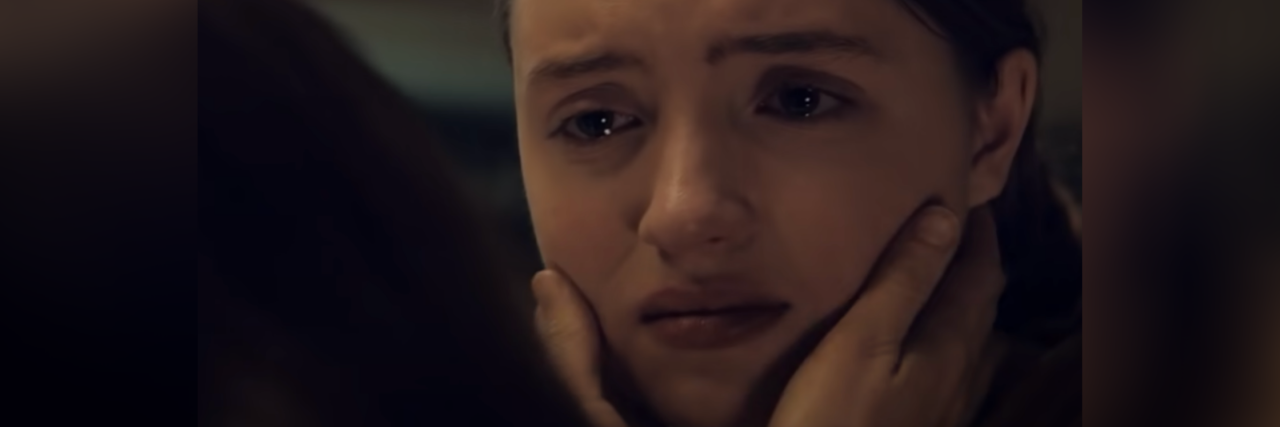From the moment the “Run” starts, you are drawn into the struggle of Chloe, a young lady who appears to be living with multiple physical struggles, its effects on a family and caregiver and the struggle to succeed and overcome overwhelming physical odds. In spite of her numerous “apparent” illnesses (which we later discover she may or may not have, identified at the beginning of the movie), we see a young lady succeeding and ready to spread her wings and begin her life in college. Eagerly awaiting news of her acceptance to college, she works hard and strives to succeed in spite of these challenges.
Yet in spite of all of this success, there is a battle waging in Chloe’s mind– “Am I a burden?”
As she sits across from her mom, Chloe asks the question that plagues every person I know battling chronic illness– “Am I a burden?” When I heard Chloe voice this sentence, it jolted me. Having battled RA since 15, and now Parkinson’s Disease at 45, I cannot tell you the times this exact question has haunted my mind. Last year, I asked my wife a very similar question, “Am I enough?”
I looked at all my wife and family had to deal with. I saw the pain they battled watching my struggle. I saw the things they missed out on and the financial struggle my illness caused, and thought of how much easier and more fulfilling her life would be without me, and just finally had to ask, “Am I enough?”
Chloe expressed the fear of being a burden that all who battle chronic illness face. This fear is expressed in many ways — maybe others have to do everything for you. Maybe there are things you can’t do that others can. Maybe it is the financial burden, or the activity limitations or the emotional and physical toll– but whatever it is, it is basically the same question — “Am I a burden?”
And that, more than anything, is the true struggle all who battle chronic illness face, “Am I a burden? Wouldn’t you be better off not having to deal with and care for me?” This struggle, more than others, might just be the hardest mountain to overcome for those in the midst of battling a body that is chronically ill, and largely, it is a battle of the mind. No amount a reassurance will correct it, but it is something each person battling chronic illness must choose to believe. “Am I a burden? No,” but that is a reality only I can choose to live in.
While this theme is front and center in this story, very quickly you realize there’s something else at play — another battle that takes place in the mind. When mom returns home with the groceries one day, and as Chloe is pouring through the bags searching for her favorite treat, she discovers pills for her mom which later her mom gives to her to take. Through a suspicious conversation Chloe becomes alarmed that things may not be what they truly are. This sets her on an exploration to discover the truth about her health and ultimately her family.
What one thinks is a movie about Chloe’s struggles, overcoming and whether she is a burden or not, quickly becomes a very sad mental illness story faced by many. Munchhausen syndrome by proxy. This mental health problem causes caregivers to make up or cause an illness or injury in a person under their care. Many times, this person is a child or an elderly adult or even a person with a disability.
In this movie, initially the mom is portrayed as very caring and concerned for her daughter, but even in those initial impressions, we see a mom more concerned for herself than for her daughter’s future as seen in the response to her daughter going away to college. The reality that this disease is controlling the mom’s actions, and to some degree she cannot control this, shows the depth and danger of this illness.
So compelling was the story and portrayal. You felt as if you were living the experience with Chloe. Often individuals with this disorder display medical skills, extreme devotion to their child/person in their care and seek out sympathy or attention from others. All of these were displayed by the mother as you watched her desperately strive to maintain control, manipulating the situation at every turn.
Yet even in all of this, mom truly believed that she was doing this all for her daughter’s good and that this was not harmful to her. In spite of what the daughter is put through, you genuinely feel sadness for the mother and the struggle in her mind that she is battling. You see that the victim of this disease is not just the one being cared for, but the one “caring” for the person. Seeing first-hand the destructive effects of this disease on a family is truly heart-breaking.
In a final chilling scene, we see the adopted daughter following after her “mother” and putting her through some of the same trauma, subtlety introducing the question of whether this disorder is nature or nurture, a very real question in medical professional’s minds. This story shows a chilling and realistic picture of families that must walk through this disease. Highlighting these struggles is never easy, but so necessary to bring attention to this and other illnesses, helping others see and understand the battles others must face.

